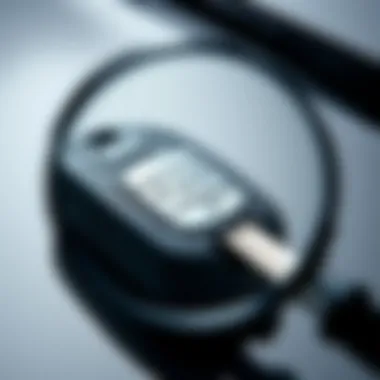Free VIN Number Checks: A Comprehensive Guide


Intro
Understanding your vehicle's history is a crucial step in the journey of car ownership. A Vehicle Identification Number (VIN) holds the key to unlocking this information, serving as a unique identifier for every vehicle on the road. Obtaining a VIN check for free might seem like a daunting task, but fortunately, a variety of resources exist. This guide aims to shed light on these resources, providing insight into both the benefits and limitations of free VIN checks, ensuring that automotive enthusiasts, potential car buyers, and experts make well-informed decisions.
Industry Overview
In the automotive sector, VIN checks play a vital role in safeguarding buyers from potential pitfalls, such as fraud or unexpected repairs. As the market evolves, the significance of these checks has only grown, fueled by an increasingly aware consumer base.
Current Market Trends
The vehicle market has shifted notably in recent years, with buyers becoming keenly aware of the importance of vehicle history. Consumers now demand transparency, and as a result, the demand for VIN checks is on the upswing. Many individuals are opting to research vehicles online before making purchases, leading to a greater availability of resources for obtaining VIN information at no cost. Furthermore, the proliferation of mobile apps has created a newfound convenience for users looking to access this information quickly.
Key Players and Competitors
Several notable players inhabit the VIN checking arena. Websites like Carfax and AutoCheck charge fees for in-depth reports, while alternatives such as the National Highway Traffic Safety Administration (NHTSA) offer free, limited information. Moreover, newer apps and platforms continually emerge, striving to bridge the gap between comprehensive vehicle history and affordability.
Recommendations for Consumers
Navigating the crowded marketplace of vehicle history checks can be daunting for consumers. Thankfully, some best practices can ease this process.
Best Practices for Evaluating Cars
When considering a purchase, here are some critical tips:
- Cross-check information: Use multiple sources to gather information about the vehicle. Free VIN checks may provide limited details, so complement them with information from paid services when necessary.
- Inspect the vehicle: Always conduct a physical inspection, preferably with a mechanic. A VIN check can provide some history, but firsthand observation is irreplaceable.
- Consider vehicle recalls: Verify if there have been any recalls on the vehicle's make and model using the VIN. Keeping safety in mind should always be a priority.
How to Use Ratings Effectively
Ratings can serve as a quick reference, but they often require context for proper interpretation. Here’s how to use them effectively:
- Look for patterns: If a vehicle has a consistent pattern of negative reviews, that should raise a red flag.
- Be aware of biases: Some ratings may be skewed by personal experiences or expectations that don't reflect the general experience. Take note of the reviewers' background and vehicle knowledge.
"A VIN check is not just a formality; it’s a pivotal tool in protecting your investment and ensuring peace of mind before making a purchase."
In summation, accessing VIN information for free is feasible through various methods, but it doesn’t come without its limitations. With the right approach and knowledge, consumers can navigate the complexities of vehicle history checks, ultimately leading to sound automotive decisions.
Understanding the VIN and Its Importance
The Vehicle Identification Number, or VIN, serves as the fingerprint of every automobile. Understanding this unique number can significantly change how a person approaches buying, selling, or even insuring a vehicle. In this section, we will explore what a VIN is, its components, and why it’s so vital in the automotive realm.
Definition of VIN
At its core, the VIN is a 17-character string that includes both numbers and letters. It is assigned to each vehicle when it’s manufactured and remains with that vehicle for its entire lifespan. Think of the VIN as the vehicle’s social security number; it offers a way to identify and track a specific car across different platforms, databases, and jurisdictions.
Components of a VIN
A VIN is like a recipe that combines various elements to provide a complete picture of the vehicle’s identity. Here are the essential components:
- World Manufacturer Identifier (WMI): The first three characters indicating the manufacturer, country, and vehicle type. For instance, a VIN starting with "1HG" tells you it’s a Honda made in the USA.
- Vehicle Descriptor Section (VDS): Characters four through nine, providing details about the vehicle's model, body style, engine type, and safety features. These characters help differentiate between similar models.
- Vehicle Identifier Section (VIS): The last eight characters offer unique details about the specific vehicle, such as the production year, assembly plant, and production number. For example, if a car is built in 2020, the ninth character will be a "0".
Significance of the VIN in Vehicle Identification
The significance of the VIN cannot be overstated. It plays a crucial role in various aspects of vehicle ownership and management. Here are a few reasons why it matters:


- Tracking History: The VIN allows potential buyers to access a vehicle’s history. It reveals past ownership, accidents, and even service records, offering critical insights that can influence buying decisions.
- Safety Recalls: Automotive manufacturers use the VIN to notify vehicle owners about safety recalls. Knowing a vehicle's recall status can be life-saving.
- Legal Protection: The VIN helps in avoiding fraudulent transactions, like VIN cloning, where a stolen car is disguised with a legitimate VIN. In this context, understanding the VIN can be crucial for legal recourse.
- Insurance Purposes: Insurance companies often require the VIN when processing claims or determining policy rates. A clear history can impact your premium rates.
"In the realm of automotive ownership, knowing the VIN can be your best tool against fraud and uncertainty."
Understanding the VIN in depth should empower automotive enthusiasts and potential buyers with the necessary knowledge to make informed decisions, whether they are purchasing a new or used vehicle. This awareness of VIN's function and importance provides greater confidence in navigating the often murky waters of auto transactions.
Benefits of Running a VIN Number
Understanding the advantages of running a Vehicle Identification Number (VIN) check can be pivotal for anyone looking to purchase a vehicle or keep tabs on their current one. A VIN is more than just a series of numbers; it holds the vehicle's entire history and often serves as a vital tool in making informed automotive decisions. By delving into the benefits of running a VIN number, individuals not only safeguard their investments but can also improve their overall vehicle ownership experience.
Vehicle History and Ownership
Running a VIN check provides invaluable insights into a car's past. From previous ownership records to mileage verification, such details can minimize the risk of purchasing a lemon. For instance, if you find out a vehicle has had multiple owners within a short time frame, that may raise a red flag about its reliability. Furthermore, a clear history often reflects a well-cared-for vehicle, while one riddled with accident reports can signal potential problems.
In particular, services such as Carfax and AutoCheck offer detailed reports that include accidents, service records, and title issues. While their full reports come with a fee, they often allow consumers to preview some basic information for free. Making this a part of your buying process can save a buyer not just money, but also headaches down the road.
Safety Recalls and Compliance
Another crucial aspect to consider when running a VIN check is safety recalls. Automakers sometimes issue recalls for various reasons, whether it’s an issue with the brakes, airbag deployment, or software glitches. Knowing about these recalls allows you, as a potential buyer or current owner, to determine whether they have been addressed already.
You can easily check for recalls through the National Highway Traffic Safety Administration (NHTSA) website. Entering your VIN there can provide quick answers about whether the particular vehicle has any outstanding recalls, which is essential for ensuring your car meets safety standards. Additionally, compliance with state regulations can often be verified via the state's motor vehicle department website. Keeping this step in mind ensures that safety is prioritized.
Fraud Prevention
Fraud in the automotive world can take many forms, from odometer tampering to title fraud. Running a VIN number significantly diminishes the risk of falling prey to deceitful practices. For example, if a seller claims a car has 30,000 miles on the clock, but a VIN check reveals a prior record of 80,000 miles, it could indicate an attempt to disguise the true condition of the vehicle.
Moreover, verifying the information against official databases also alerts a buyer to stolen vehicles. If the VIN matches a report indicating that it was reported stolen, that’s a clear sign to walk away. Modern technology and readily available online resources make it easier to catch these discrepancies that could lead to significant financial loss.
"A thorough VIN check can keep you a step ahead of fraudsters, making for a smoother, safer car purchasing experience."
Methods for Running a VIN Number for Free
When it comes to buying or selling a vehicle, understanding its history is paramount. Running a VIN number for free provides a cost-effective way to obtain valuable information about a vehicle. This method helps potential buyers make informed decisions and ensures that they are not falling prey to hidden issues like accidents, thefts, or extensive repairs. It’s important to know the pitfalls of free resources, but there are definite advantages worth exploring.
Using Government Resources
National Highway Traffic Safety Administration (NHTSA)
The National Highway Traffic Safety Administration (NHTSA) plays a key role when seeking out free VIN checks. One of its noteworthy offerings is the ability to check for recalls related to a specific VIN. By entering the VIN in their search tool, users can easily access information about any safety recalls linked to the vehicle. This is a notable advantage because recalls can signify serious safety issues that require immediate attention from manufacturers.
NHTSA is a trusted source of vehicle data, and its databases are regularly updated, making it a reliable choice for verifying vehicle history. However, one limitation is that the NHTSA does not provide comprehensive details about the vehicle’s previous ownership or accidents. Therefore, while it excels in identifying recalls, it might not be sufficient alone for potential buyers.
Motor Vehicle Departments
State Motor Vehicle Departments also present a viable option for running free VIN checks. Each department operates its own database where vehicle ownership details are maintained. This means that individuals can find out about the vehicle’s registration status, title information, and previous ownership—key factors in determining the authenticity of a car purchase.
The biggest plus of utilizing Motor Vehicle Departments is that they often have detailed records tied to the VIN, including if the car has had a salvage title or a lien. A drawback, however, is that accessing this information may involve navigating through state-specific processes and sometimes paying small fees, depending on the state’s policies. Overall, they provide additional layers of information which can be crucial in the vehicle-purchasing process.
Online VIN Check Tools
Free VIN decoders
Free VIN decoders are another effective method for obtaining information about vehicles. These online tools allow users to dissect the VIN into its individual components, revealing essential data such as the manufacturer, year of manufacture, type of vehicle, and even assembly plant location. This can be really handy for buyers wanting to ensure they are looking at the correct specifications.
The signature feature of these decoders is their ease of use. Most tools are simply a couple of clicks away and provide quick results. The downside is that while they offer basic details about a vehicle, they do not delve into the vehicle’s history, such as past accidents or ownership records. For a comprehensive picture, further investigation would be necessary.


Vehicle history report websites
Vehicle history report websites—like Carfax or AutoCheck—allow users to check VINs, revealing a treasure trove of information that includes accident history, past ownership, and mileage records. They often pull data from various sources, making them popular among those serious about purchasing a used vehicle.
The main advantage here is the depth of information available. However, while some functions allow for free checks, full reports could come with a fee. Thus, prospective buyers can find themselves at a crossroads when deciding if they want to invest in thorough data versus sticking with a free service that might only scratch the surface of a vehicle’s history.
Social Media and Community Resources
Automotive forums
Automotive forums are informal yet potent resources for those running a VIN check. Here, members share their experiences, insights, and even provide assistance in looking up vehicle history. Discussions often cover specific makes and models, revealing common issues through other users’ shared experiences.
The value of these forums lies in their community-driven information. However, since the information is anecdotal, one should tread carefully and not take everything at face value. It can be an excellent starting point to engage with seasoned users, but confirmation from more authoritative sources is advisable.
Online community recommendations
Tapping into online community recommendations offers another avenue for running a VIN check. Websites such as Reddit have sections dedicated to vehicle discussions where users exchange advice on VIN checks and which resources yield the most accurate results. It allows a real-time sharing of experiences and can guide users towards lesser-known but efficient resources.
The crux here is the informal access to collective wisdom from car enthusiasts. On the flip side, just like forums, the reliability of the information can be a bit of a gamble, as it isn’t always based on structured data.
In summary, while there are ample methods for running a VIN number for free, understanding the limitations and features of each resource is crucial for making informed automotive decisions. From government databases to community forums, each option has its distinct advantages and potential drawbacks.
Limitations of Free VIN Checks
When it comes to running a VIN check, the allure of free services is hard to resist. However, while the prospect of obtaining vehicle information without parting with cash sounds great, it is crucial to recognize the limitations that accompany these free checks. Acknowledging these constraints helps automotive enthusiasts and potential car buyers make informed and judicious decisions concerning vehicle history inquiries.
Data Accuracy and Reliability
Not all information is created equal, and this rings particularly true when utilizing no-cost VIN check resources. The crux of the matter lies in the accuracy and reliability of the data presented. Many free services rely on participation from users or public records that may lack thoroughness. As a result, you might find yourself seeing information that is either incomplete or, in some instances, downright inaccurate. Imagine finding out that a used car has a clean title only to later discover it had been in two accidents—definitely not the kind of surprise you want when buying a vehicle.
"Data from free sources, like the old adage goes, may come cheaper, but the saying holds water: you get what you pay for."
Moreover, certain free platforms may not get updated as frequently as their paid counterparts. Therefore, the likelihood of encountering outdated information becomes elevated. As such, it's essential to corroborate what you find through free services against other reliable sources like official DMV records.
Scope of Available Information
The breadth of information provided by free VIN checks can often be quite restrictive. Many free platforms deliver only minimal details about the vehicle—often just the basic identification, a few specs, and perhaps some recall notices. This limited scope can leave you without crucial context, such as previous ownership history, accident records, or any title issues. It's like trying to solve a jigsaw puzzle with half the pieces missing.
In stark contrast, paid VIN check services typically provide comprehensive reports, including transaction history, potential liens, and even service records. Therefore, if you're serious about a particular vehicle, relying solely on free checks might leave you feeling like you have more questions than answers.
Potential for Outdated Records
The world of auto ownership, especially when it comes to used cars, is in a constant state of flux. Every day, countless transactions take place, titles change hands, and accidents may go unrecorded for a time. When one opts for a no-cost VIN check, the possibility of encountering outdated records increases significantly.
For instance, if a vehicle was recently involved in an accident or received a new title, but the free service hasn't been updated to reflect that, you could walk into a potentially sticky situation without even knowing. Vehicle history can change overnight, but free services may not always be on top of that. In essence, relying too heavily on these resources at the expense of more timely, thorough updates from paid services could ultimately lead to decisions you might regret down the line.
Comparing Free vs. Paid VIN Check Services
When individuals consider running a VIN check, they often wade through a sea of options, ranging from free services to those that come with a price tag. Recognizing the differences and potential advantages of each can significantly impact the decisions made by car buyers and enthusiasts. Understanding whether the savings associated with free checks outweigh the benefits provided by paid services is essential to navigate the market efficiently.
Cost Considerations
The first point for many when pondering VIN checks is cost. Free services are tempting; who doesn’t like the sound of getting something for nothing? However, the old saying, "you get what you pay for" certainly rings true here. Free VIN checks can provide basic information, yet often this is limited to fundamental details like make, model, and sometimes ownership history.
On the other hand, paid services usually offer a tiered pricing model, allowing customers to choose a plan that fits their needs. While these checks may have upfront costs, they often deliver comprehensive reports, including details about accidents, service history, and detailed ownership data. Therefore, when considering cost, it’s crucial to weigh not just the price, but what you're getting in return. Sometimes, a few extra dollars could save a buyer from making a costly mistake down the line.


Depth of Information Provided
Many free VIN checks can feel like dipping a toe into a pool; you might get an idea of the temperature, but not the full experience. Free reports can sometimes be just a taste, offering basic stats without diving deep into the nuances that might affect your purchase decision. Commonly provided information might include:
- Simple vehicle specifications
- Basic ownership history
- Manufacturer recalls
In contrast, paid VIN checks often give a far richer experience. These reports may detail:
- Accident history and severity
- Service records with dates and types of maintenance performed
- Potential odometer rollbacks or fraud history
Paid services tend to pull from more extensive databases and cross-reference information, thus providing a clearer picture of a vehicle's past. This depth can be invaluable as it helps buyers avoid lemon purchases and make informed decisions.
User Experience and Access
How user-friendly a service is can make or break the experience. With free VIN checks, many platforms can be cumbersome, or sometimes they may require additional steps like signing up for a newsletter or inputting personal information. While some might find these hurdles trivial, others could consider them a nuisance, ultimately leading to frustration.
Paid services, however, typically aspire to offer an optimized user experience. These services are often designed with the customer in mind, featuring intuitive interfaces, quick access to reports, and efficient customer service. They provide seamless navigation through the process, thereby saving users both time and effort.
Tips for Conducting a VIN Check
Running a VIN check can seem daunting at first, but with the right approach, you can uncover valuable information about a vehicle's history. This process goes beyond merely obtaining a title to understanding the vehicle’s past. When looking for a new car, especially a used one, consider these tips carefully to ensure your investment is sound.
Choosing the Right Service
Selecting a trustworthy service for your VIN check can mean the difference between a secure purchase and a potential disaster. Not all platforms are created equal. Some might offer scant information while others provide detailed histories. To make an informed decision, look out for these pointers:
- Reputation: Investigate forums and user reviews to see what other buyers have experienced. Websites like Reddit can provide insights.
- Features Offered: Services come with varying features. Some offer basic information while others provide in-depth reports, including accident history and previous ownership.
- Accessibility: Some services have mobile-friendly interfaces, which can be useful for on-the-go checks.
- Cost Transparency: Even if a site offers free checks, be wary of hidden costs when accessing in-depth reports. Always read the fine print.
Validating the Information Obtained
Once you've run a VIN check, validating the information is crucial. Misleading or inaccurate reports can lead to grave consequences. Here's how to ensure the information you received is valid:
- Cross-Reference Data: Use multiple sources to confirm the vehicle's details. If one report states the car has never had an accident, cross-verify it with another site or report.
- Verify Ownership: Checking with the local Department of Motor Vehicles (DMV) can help confirm the number of times the vehicle has changed hands, which could indicate potential issues.
- Check for Recalls: Directly consult the National Highway Traffic Safety Administration’s database to see if any safety recalls were issued related to the VIN.
Supplementing with Additional Research
While a VIN check provides a solid foundation, it's wise to complement it with broader research. Consider these additional steps:
- Visit Automotive Forums: Engage with communities on platforms like Facebook or niche sites. Posts can reveal the experiences of other owners with the same make and model.
- Contact Previous Owners: If possible, speak with previous owners to gather firsthand stories about the vehicle's performance and maintenance.
- Inquire About Repairs: Ask the seller for service records. If a car has had numerous repairs, it may signal underlying problems that could cost you down the road.
In summary, conducting a thorough VIN check involves more than just hitting a button and waiting for results. It requires careful selection of services, validation of the findings, and additional research to ensure you are making a wise purchase. Each step in this process is vital to protecting yourself from potential pitfalls in the automotive market.
The End
In wrapping up our exploration of running a VIN number for free, we find ourselves staring at a valuable tool for those navigating the often murky waters of vehicle history. Understanding the components and significance of the Vehicle Identification Number is crucial. The VIN is not merely a series of letters and digits; it encapsulates critical information about a vehicle’s past, ownership, recalls, and more.
Recap of Key Points
Let's briefly revisit the essential elements we've discussed:
- Understanding VIN: The VIN is a unique identifier for vehicles, highlighting its importance in tracking history and specifications.
- Benefits of Running a VIN: Accessing vehicle history can prevent future headaches by revealing ownership records, safety recalls, and potential fraud.
- Methods for Free Checks: Several resources are at our fingertips, including government databases, online tools, and community-driven platforms like forums.
- Limitations: While free checks provide a wealth of information, they come with limitations regarding data accuracy and completeness, often leading to outdated records.
- Paid Services Comparison: For those who seek deeper insights, weighing the costs versus benefits of paid services is vital. The depth of information they offer can be a game-changer.
- Practical Tips: Choosing the right service and validating any information are essential steps in ensuring the integrity of the data you gather.
Encouragement for Informed Decisions
Armed with this knowledge, you are now equipped to make informed decisions regarding your automotive pursuits. Whether you're contemplating a purchase or simply wish to know more about the vehicle you currently own, leveraging these VIN checks can illuminate the path forward.
When you venture into vehicle history checks, remember that the right resources are out there, waiting to lend a helping hand. This proactive approach not only safeguards your investment but also elevates your understanding of the automotive landscape. It’s about steering clear of potential pitfalls and heading straight for smart, informed choices.
If you seek to explore more about VIN checks, consider visiting NHTSA.gov for detailed resources or engaging with forums on Reddit to share experiences and gather insights from fellow automotive enthusiasts.
Stay curious and always dig deeper! This journey into the world of VIN checks serves as a testament to how a little knowledge can empower and inform your choices.















